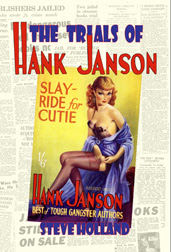Barry Shafto Jackson, aged 25, stood in the dock in Truro, Cornwall, on 1 September, and argued that it was his right to call himself Count de la Feld, claiming that his father's grandmother was the last of the house of De la Feld. It was a very old family which had been settled in England for many generations. They had a title bestowed by the Pope and he and his father were the direct descendents.
Whilst using the name Count De la Feld, he had visited Messrs. Timothy Whites and Taylors in Truro on 26 June, saying that he wanted a three months' account as he and his wife, the Countess, were planning to sail to America in September and that, meanwhile, they would be staying at a small cottage called The Haven, Mount Hawke. He gave as reference a bank in Park Lane, London.
On the strength of this statement he was given on various days goods to the value of £7 17s. 8d.
On around 12 July, the manager had his attention drawn to a London newspapaer dated 8 July, on the front page of which was a photograph of Jackson. He contacted the police and visited the premises at Mount Hawke, but found they were shut up and that Jackson was gone.
Inquiries were made to ascertain that the man in the photograph in the London papers was Barry Shafto Jackson and that he had travelled to Bristol on about 8 July. On 20 August, a Detective Sergeant Arthur Rudge of the Bristol C.I.D., went to a Bristol hotel, where he saw a woman whose age was about 60. He followed her to another hotel, where there was an entry in the register in the name of Mr. and Mrs. Beaumont. He visited the room they occupied and there saw Jackson with a woman who presumably was his wife. When cautioned, Jackson said, "You have made a mistake. My name is Beaumont." He then produced a passport bearing the name of R. D. Beaumont.
In a later statement, made after he was taken to Truro, he said that he had gone to Bristol for a short holiday and had intended returning to Mount Hawke; he had also intended paying his account at Messrs. Timothy Whites & Taylors. However, the "dreadful scandal" in the Press had made it impossible to return. He signed this statement "Feld".
In a letter written shortly afterwards, as he was being taken to Exeter Prison, he claimed that his parents had been separated for ten years and he was unsure whether his father, 2nd Lieutenant B. Roche Jackson of the 1st Gordon Highlanders, who had held a commission in the Army during the war, was alive or not. This letter he signed "Roger Beaumont".
Father Edward Charles Taylor, a Roman Catholic priest of St. Mary of the Angels, Bayswater, gave evidence that Jackson had come to him to be received into the Catholic Church and underwent a short course of instruction. Taylor knew the man as Mr. Roche Jackson and refused to agree with the prosecution counsel, Mr. Moore, that Jackson could have been made a papal count as a reward for his services to the Roman Catholic Church—Taylor said "I am not conversant with how papal counts are made or how the titles are carried on. Unless he has inherited the title I cannot see how he can be a papal count because of his short career as a Catholic."
Detective-Sergeant Rudge gave evidence that he had found visiting cards inscribed Rev. Viscount and Viscountess Beaumont of Detroit, Michigan" when he visited Jackson's room at the hotel. He also discovered a notice written on a sheet of paper: "De la Feld. On August 24, 1937. In a motoring accident near Avignon, Barry and Doreen, Count and Countess De la Feld." This obituary notice was in his wife's handwriting.
The Count then gave evidence that he was born Barry Shafto Roche Jackson and he claimed that he could call himself Count De la Feld because his father's grandmother was the last of the house of De la Feld. It was a very old family name and the title had been bestowed by the Pope. He had used the title on and off for about two years.
Jackson admitted that he had had many jobs, that he and his mother had been employed as houseboy and cook on a joint wage of £85 and that he had also been a butler. He also admitted that he had married under the name Barry de la Feld and that he and his wife had gone to Dublin on 16 August and applied to the Registrar of Marriages to be married, in order to "get the tangle of out marriage adjusted. My wife wanted to drop our title and use an ordinary English name." Whilst in Dublin, he obtained a driving license in the name of Viscount Roger Beaumont.
Admitting that he had used a number of different names and that he had posed as a Roman Catholic priest as "a journalistic trick to get our names in the paper," Jackson was found guilty and agreed to have four other charges involving another £23 taken into consideration. He was sentenced to one month's imprisonment.
According to Police-Superintendant Osborne, Jackson was, in fact, born in Dunsmore, Buckinghamshire in 1913. His mother was a housekeeper in Bayswater. His mother had told the police she believed there was a title on her husband's side, but that her husband had left her 11 years ago and she did not know his whereabouts.
There was some truth in Barry Jackson's tale. His father, Bernard Roach-Jackson, had volunteered during the Great War, joining on 14 August 1914, and he served with as a 2nd Lieutenant in the Gordon Highlanders, for which he was awarded a Silver War Badge. He was put on the H.P. (half-pay) list for ill health on 11 June 1916 and soon after, in November 1916, he was acquitted by a general court-martial for exchanging two cheques for £5 and £1 at the Carlton Hotel, knowing that he did not have sufficient funds to meet them.
He was born Bernard Jackson in Yapton, Sussex, in 1880, the son of the Revd. George Jackson (1838?-1903), rector of Ford and vicar of Yapton, and his wife Alice (1849?-1932?). Jackson grew up in Yapton and in Westfield, another Sussex town where his father was vicar. Bernard had some early experience in the military—this is mentioned on his 1914 army papers.
Bernard Roach-Jackson had married to May A. Craster in 4Q 1911 in Fulham, London, but they had not remained together; by 1918 he was living at 58 Portland Road, Holland Park Avenue, W.11, and by 1930 he could be found at 5 Fairholme Road, Fulham, W.14. He was registered as one of the civilian war dead, having died in Richmond, Surrey, on 21 September 1940, aged 70 [actually 60].
What happened to the man known as Barry Shafto Jackson is open to some speculation. His mother, May Adelaide Craster, born in 1872, was the Adelaide Roach-Jackson living at 112 Denbigh Street, Westminster S.W.1, in 1938 along with Dorothy Roach-Jackson and Francis Bentick Roach-Jackson, whom I believe to be Doreen and Barry. Although I haven't been able to nail down a birth certificate (or even registration) for Adelaide's son, I have a strong suspicion that he was originally named Francis.
I can find no further trace of him beyond this sighting in 1938. Perhaps he changed his name again and continued his career as a fraudster.
More tomorrow.
Tuesday, December 16, 2014
Subscribe to:
Post Comments (Atom)
























































No comments:
Post a Comment